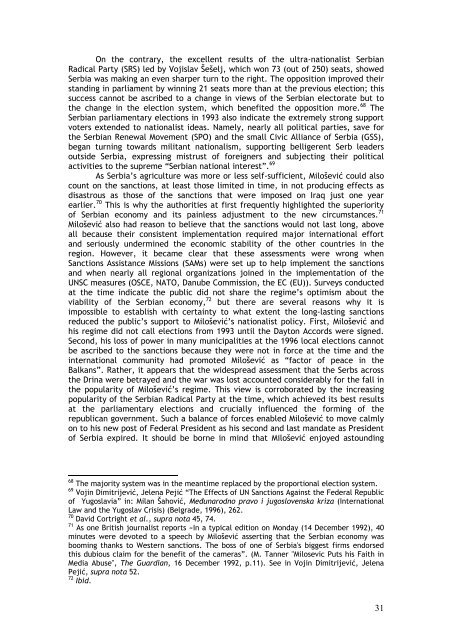Ethnic Mobilization in Serbia - EURAC
Ethnic Mobilization in Serbia - EURAC
Ethnic Mobilization in Serbia - EURAC
You also want an ePaper? Increase the reach of your titles
YUMPU automatically turns print PDFs into web optimized ePapers that Google loves.
On the contrary, the excellent results of the ultra-nationalist <strong>Serbia</strong>n<br />
Radical Party (SRS) led by Vojislav Šešelj, which won 73 (out of 250) seats, showed<br />
<strong>Serbia</strong> was mak<strong>in</strong>g an even sharper turn to the right. The opposition improved their<br />
stand<strong>in</strong>g <strong>in</strong> parliament by w<strong>in</strong>n<strong>in</strong>g 21 seats more than at the previous election; this<br />
success cannot be ascribed to a change <strong>in</strong> views of the <strong>Serbia</strong>n electorate but to<br />
the change <strong>in</strong> the election system, which benefited the opposition more. 68 The<br />
<strong>Serbia</strong>n parliamentary elections <strong>in</strong> 1993 also <strong>in</strong>dicate the extremely strong support<br />
voters extended to nationalist ideas. Namely, nearly all political parties, save for<br />
the <strong>Serbia</strong>n Renewal Movement (SPO) and the small Civic Alliance of <strong>Serbia</strong> (GSS),<br />
began turn<strong>in</strong>g towards militant nationalism, support<strong>in</strong>g belligerent Serb leaders<br />
outside <strong>Serbia</strong>, express<strong>in</strong>g mistrust of foreigners and subject<strong>in</strong>g their political<br />
activities to the supreme “<strong>Serbia</strong>n national <strong>in</strong>terest”. 69<br />
As <strong>Serbia</strong>’s agriculture was more or less self-sufficient, Milošević could also<br />
count on the sanctions, at least those limited <strong>in</strong> time, <strong>in</strong> not produc<strong>in</strong>g effects as<br />
disastrous as those of the sanctions that were imposed on Iraq just one year<br />
earlier. 70 This is why the authorities at first frequently highlighted the superiority<br />
of <strong>Serbia</strong>n economy and its pa<strong>in</strong>less adjustment to the new circumstances. 71<br />
Milošević also had reason to believe that the sanctions would not last long, above<br />
all because their consistent implementation required major <strong>in</strong>ternational effort<br />
and seriously underm<strong>in</strong>ed the economic stability of the other countries <strong>in</strong> the<br />
region. However, it became clear that these assessments were wrong when<br />
Sanctions Assistance Missions (SAMs) were set up to help implement the sanctions<br />
and when nearly all regional organizations jo<strong>in</strong>ed <strong>in</strong> the implementation of the<br />
UNSC measures (OSCE, NATO, Danube Commission, the EC (EU)). Surveys conducted<br />
at the time <strong>in</strong>dicate the public did not share the regime’s optimism about the<br />
viability of the <strong>Serbia</strong>n economy, 72 but there are several reasons why it is<br />
impossible to establish with certa<strong>in</strong>ty to what extent the long-last<strong>in</strong>g sanctions<br />
reduced the public’s support to Milošević’s nationalist policy. First, Milošević and<br />
his regime did not call elections from 1993 until the Dayton Accords were signed.<br />
Second, his loss of power <strong>in</strong> many municipalities at the 1996 local elections cannot<br />
be ascribed to the sanctions because they were not <strong>in</strong> force at the time and the<br />
<strong>in</strong>ternational community had promoted Milošević as “factor of peace <strong>in</strong> the<br />
Balkans”. Rather, it appears that the widespread assessment that the Serbs across<br />
the Dr<strong>in</strong>a were betrayed and the war was lost accounted considerably for the fall <strong>in</strong><br />
the popularity of Milošević’s regime. This view is corroborated by the <strong>in</strong>creas<strong>in</strong>g<br />
popularity of the <strong>Serbia</strong>n Radical Party at the time, which achieved its best results<br />
at the parliamentary elections and crucially <strong>in</strong>fluenced the form<strong>in</strong>g of the<br />
republican government. Such a balance of forces enabled Milošević to move calmly<br />
on to his new post of Federal President as his second and last mandate as President<br />
of <strong>Serbia</strong> expired. It should be borne <strong>in</strong> m<strong>in</strong>d that Milošević enjoyed astound<strong>in</strong>g<br />
68 The majority system was <strong>in</strong> the meantime replaced by the proportional election system.<br />
69 Voj<strong>in</strong> Dimitrijević, Jelena Pejić “The Effects of UN Sanctions Aga<strong>in</strong>st the Federal Republic<br />
of Yugoslavia” <strong>in</strong>: Milan Šahović, Međunarodno pravo i jugoslovenska kriza (International<br />
Law and the Yugoslav Crisis) (Belgrade, 1996), 262.<br />
70 David Cortright et al., supra nota 45, 74.<br />
71 As one British journalist reports «In a typical edition on Monday (14 December 1992), 40<br />
m<strong>in</strong>utes were devoted to a speech by Milošević assert<strong>in</strong>g that the <strong>Serbia</strong>n economy was<br />
boom<strong>in</strong>g thanks to Western sanctions. The boss of one of <strong>Serbia</strong>'s biggest firms endorsed<br />
this dubious claim for the benefit of the cameras”. (M. Tanner "Milosevic Puts his Faith <strong>in</strong><br />
Media Abuse", The Guardian, 16 December 1992, p.11). See <strong>in</strong> Voj<strong>in</strong> Dimitrijević, Jelena<br />
Pejić, supra nota 52.<br />
72 Ibid.<br />
31

















